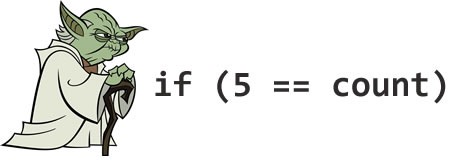Every field comes up with its own jargon, and oftentimes subgroups within a field come up with their own specific words or phrases (those of you familiar with Microsoft Canada’s Developer and Platform Evangelism Team know that we have our own term for “broken”, named after one of our teammates who is notorious for killing all sorts of tech gear).
A question recently posted on Stack Overflow asked for people to submit programming terms that they or their team have coined and have come into regular use in their own circles. I took a number of the submissions and compiled them into the alphabetically ordered list below for your education and entertainment.
Have you come up with your own jargon? Tell us in the comments!
Banana Banana Banana

Placeholder text indicating that documentation is in progress or yet to be completed. Mostly used because FxCop complains when a public function lacks documentation.
Example:
/// <summary> /// banana banana banana /// </summary> public CustomerValidationResponse Validate(CustomerValidationRequest request, bool ...
Barack Obama
A project management account to which the most aspirational tickets – stuff you’d really like to do but will pobably never get approval for – gets assigned.
Bicrement
Adding 2 to a variable.
Bloombug
A bug that accidentally generates money. [Joey’s note: I have never written one of these.]
Bugfoot

A bug that isn’t reproducible and has been sighted by only one person. See Loch Ness Monster Bug.
Chunky Salsa
A single critical error or bug that renders an entire system unusable, especially in a production environment.
Based on the chunky salsa rule from TVTropes: Any situation that would reduce a character’s head to the consistency of chunky salsa dip is fatal, regardless of other rules.
Configuration Programming / Programmer
Someone that says they are a programmer but only knows how to hack at configuration files of some other pieces of software configuration to make them do what they want.
Counterbug
A defensive move useful for code reviews. If someone reviewing your code presents you with a bug that’s your fault, you counter with a counterbug: a bug caused by the reviewer.
DOCTYPE Decoration
When web designers add a proper DOCTYPE declaration at the beginning of an HTML document, but then don’t bother to write valid markup for the rest of it.
Drug Report
A bug report so utterly incomprehensible that whoever submitted it must have been smoking crack. The lesser version is a chug report, where the submitter is thought have had one too many.
Duck

A feature added for no other reason than to draw management attention and be removed, thus avoiding unnecessary changes in other aspects of the product.
This started as a piece of Interplay corporate lore. It was well known that producers (a game industry position, roughly equivalent to PMs) had to make a change to everything that was done. The assumption was that subconsciously they felt that if they didn’t, they weren’t adding value.
The artist working on the queen animations for Battle Chess was aware of this tendency, and came up with an innovative solution. He did the animations for the queen the way that he felt would be best, with one addition: he gave the queen a pet duck. He animated this duck through all of the queen’s animations, had it flapping around the corners. He also took great care to make sure that it never overlapped the “actual” animation.
Eventually, it came time for the producer to review the animation set for the queen. The producer sat down and watched all of the animations. When they were done, he turned to the artist and said, “That looks great. Just one thing – get rid of the duck.”
Fear-Driven Development
When project management adds more pressure, such as by firing a member of the team.
Ghetto Code

A particularly inelegant and obviously suboptimal section of code that still meets the requirements. [Joey’s note: I’ve written ghetto code before, but that’s because I’m street, yo!]
Hindenbug
A catastrophic data-destroying bug. Oh, the humanity!
Hocus Focus Problem
Unexpected behavior caused by changes in focus, or incorrect setting of focus. Could also be used to describe an app stealing your focus.
Hot Potato / Hot Potatoes
A fun way to pronounce http:// and https://.
IRQed
Annoyed by interruptions. Pronounced like and has a similar meaning to “irked”.
Jimmy

A generalized name for the clueless/new developer. The submitter at Stack Overflow writes:
We found as we were developing a framework component that required minimal knowledge of how it worked for the other developers. We would always phrase our questions as: “What if Jimmy forgets to update the attribute?”
This led to the term “Jimmy-proof” when referring to well designed framework code.
It’s probably best not to use this term around IronRuby developer Jimmy Schementi.
Loch Ness Monster Bug
A bug that isn’t reproducible and has been sighted by only one person. See Bugfoot.
Megamoth
MEGA MOnolithic meTHod. Usually stretches over two screens in height and often contained inside a God Object (an object that knows or does too much).
.NET Sandwich
When .NET code called native code which calls other .NET code and makes the poorly designed application crash.
n-gleton
A class that only allows a fixed number of instances of itself.
NOPping
Not napping, but simply zoning out. Comes from the assembly language instruction NOP, for No OPeration, which does nothing.
Pokemon Exception Handling
For when you just gotta catch ’em all!
Reality 101 Failure

The program (or more likely feature of a program) does exactly what was asked for, but when it’s deployed it turns out that the problem was misunderstood and the program is basically useless.
Refuctoring
The process of taking a well-designed piece of code and, through a series of small, reversible changes, making it completely unmaintainable by anyone except yourself. It’s job security!
The Sheath
The isolating interface between your team’s (good) code, and the brain-dead code contributed by some other group. The sheath prevents horrible things (badly named constants, incorrect types, etc.) in their code from infecting your code.
[Joey’s note: I’ve heard the term “shim” used for this sort of construct. I’ve used the term “transmogrifier” for this sort of thing.]
Shrug Report
A bug report with no error message or “how to reproduce” steps and only a vague description of the problem. Usually contains the phrase “doesn’t work.”
Smug Report
A bug report submitted by a user who thinks he knows a lot more about the system’s design than he really does. Filled with irrelevant technical details and one or more suggestions (always wrong) about what he thinks is causing the problem and how we should fix it.
Stringly-Typed

A riff on strongly-typed. Used to describe an implementation that needlessly relies on strings when programmer- and refactor-friendly options are available.
Examples:
- Method parameters that take strings when other more appropriate types should be used
- On the occasion that a string is required in a method call (e.g. network service), the string is then passed and used throughout the rest of the call graph without first converting it to a more suitable internal representation (e.g. parse it and create an enum, then you have strong typing throughout the rest of your codebase)
- Message passing without using typed messages etc.
Excessively stringly typed code is usually a pain to understand and detonates at runtime with errors that the compiler would normally find.
Unicorny
An adjective to describe a feature that’s so early in the planning stages that it might as well be imaginary. This one comes from Rails Core Team member Yehuda Katz, who used it in his closing keynote at last year’s Windy City Rails to describe some of Rails’ upcoming features.
Yoda Conditions

The act of using
if (constant == variable)
instead of
if (variable == constant)
It’s like saying “If blue is the sky”.
367 replies on “New Programming Jargon”
[…] Nachzulesen ist das Ganze hier (in englischer Sprache): Klick. […]
s11n
The word “s11n” was coined by co-developed Rusty Ballinger as a short form for “serialization” (in 2003, if i recall correctly), using the same conventions as the words i18n and l10n. i later stole his word when founding the s11n project (http://s11n.net).
@wofat68 (about if(variable == true): )
It’s called literate programing. You should try it, it’s great for non-self-centered coders that understand that some newbie will maintain that code one day.
Non-self-centered in the sense that when someone else do not agree with you they are not “totally like don’t get it” and are not “obviously do not understand the language”.
Whenever I see someone checking in Yoda conditionals, I sneak over to their terminal, undo it, and put a few show-stopped bugs in their code. I hate them and want them fired, then blackballed from the community, forced to eat out of garbage cans if they are lucky.
A couple more me and my collegues use everyday:
“Code blind” – When you’ve been looking at something for so long you miss the glaringly obvious mistake. Usually happens after too much coffee/beer and a 16 hour working day.
“Bosh it” I think has been around for a while, a bit like ‘Macgyver’ing your code, just make it work using whatever is available. If you’ve become code blind, best option here is to pull out the bosh hammer and hit it a few times until things start working.
@wofat68: you obviously never dealt with as3 and the way it handles nulls in if statements…
Project Unicorn.
See Unicorny. Essentially a project so ambitious it will never launch or exist, much like the mythical unicorn.
http://stackoverflow.com/questions/2349378/new-programming-jargon-you-coined/2367858#2367858
Brilliant little list here, I especially like banana banana banana at the beginning, and I personally have been the perpetrator of a fair amount of refuctoring in my time :)
But seriously, do people not read the comments at all? Nearly half of all comments here are basically saying exactly the same thing about the Yoda conditions thing. Ok to say whether or not you use it (personally I don’t most of the time, but am trying to get into the habit), but it gets a bit monotonous with everyone all saying why it works. Yes, we all know it avoids incorrect assignment and NPEs, you don’t need to assert yourself to everyone by telling us you do too, enough people have already!
@wofat68 How about ‘truetalitarian’
That was one of the funniest programming thing I’ve ever read!
[…] Nerdy put out a list of new programming jargon, some of which is […]
Voodoo
(noun)
When you have no idea what’s causing a bug and have resorted to random, highly unlikely (p < 10^-5) "potential fixes" to try to get the bug to go away, usually while running automated tests against a convoluted mass of poorly written threads with randomly alternating sleep timers to try to get lucky and find the one case in a billion where the bug might actually occur.
Hello World Test Case
(noun)
Automated test code, the only purpose of which is to make test case junkies happy, written against code which is so trivial that it doesn't merit having a test case written for it.
Deproducible
(adj)
Said of a bug that occurs under the debugger but not in released code.
For even more jargon and a good slice of computer history, check out http://www.catb.org/jargon/ – the Jargon File.
Someone mentioned BM or BFM — Black Magic or Black F** Magic. A bug that inexplicably is “fixed” by changing something that shouldn’t have anything to do with the original bug.
I have always referred to that as Voodoo or F*** Voodoo. :-)
I like the ‘Yoda Conditions’. Its part of our companies programming handbook to prevent and find very quick this small but effective mistakes: if ( variable = constant ).
Very helpfully!
oh guys how much you made me laugh on those.
it’s too good
clearly the work of pure geek-ish linguists
the Yoda Conditions is great… Not the practice itself (you can like it or not), but the name is just GENIAL! ROFL!!
[…] New Programming Jargon — Global Nerdy Mostly repeats. But I like "Bugfoot" (tags: blog code development humor jargon language programming software fun funny geek) […]
“jLang”
Code coded by a coder who codes by obfuscating when they code. IE: Their code looks like it’s been through an obfuscator, but it’s from the developer.
Named after a great friend of mine I used to work with named Jackie.
Gonkulate.
Generally describes the process of coming up with estimates for a complicated project (typically waterfall, but by no means does waterfall have a monopoly on gonkulation). Gonkulated estimates are rarely accurate.
On one project years ago, the whole team rolled their estimates up into a single master spreadsheet – named the “Gonkulator”. This term was even used by project management when presenting cost estimates to upper management “well, we have a high degree of confidence in these numbers, because they came from the Gonkulator”.
We have a lot of “Trooleans” (tri-state Boolean). You can recognize a troolean when you see a class that has a Boolean field where null is used to indicate something. Typically, trooleans are used to indicate a yes/no choice that the user has (or has NOT) made. Trooleans lead to confusion and NPEs.
Shouldn’t all this be absorbed into the Jargon File? Or are we assuming Eric Raymond won’t be interested in adding it?
Don’t forget the Heisenbug: A bug that disappears as soon as you put any kind of instrumentation or debug code in place.
1. Why is there no way of scrolling forward through comments as well as back? Who wrote the software here?
2. Some people don’t read the earlier comments: the same comment has been made about Yoda conditions and Heisenbugs many times.
3. I agree with Aaron, who suggested “Sherlock Comment” here. Let’s hope it catches on:
> >I am not aware of a term for this, but it needs one. I am talking about
> >comments that point out something that is completely obvious from
> >the code anyway, e.g. this:
> >
> > a++; // add one to a
>
> I’d call that the Sherlock comment. As in…. NO SH*T, SHERLOCK.
>
> ;-)
4. I propose “retardumentation” as a term for documentation that serves no purpose as the level at which is pitched is so low that the only people who might find it useful are those who would in any case be unable to read and write. Printed guides that come in the box with most new computers I would mostly classify as retardumentation.
Yoda conditions are actually a good habit, at least when using changeable variables. Consider the difference between “if(count == 5)” and “if(count = 5). Always writing Yoda conditions will make the compiler catch this typo for you, since “if(5 = count)” will generate an error.
[…] Blog: New Programming Jargon […]
I really like the Heisenbug.
… makes me ponder what Schroedinger’s Bug could be …
Firedbug – a js bug which dissapears as soon as firebug is opened
[…] raquo; New Programming Jargon […]
You could argue that all programming is simply configuration.
Now I feel depressed…..
[…] New Programming Jargon – it's a funny list […]
I have no idea where the Heisenbug is but I know exactly how fast it is moving.
I write Yoda Conditions because one of the languages I use is C, where it makes sense to eliminate one more source of error. But, I write Yoda Conditions in EVERY language I use so that I will be in the habit of doing so. I use VBA which uses a single “=” in comparisons, so writing “==” is not as second nature as it would be otherwise. Frankly, those condemning the practice probably don’t have as much experience as those who use it.
A Schrödinger bug is a bug that could appear as a feature and you would need to look at the code to determine whether it is a bug or a feature? :)
Death Star – A company that destroys everything you create and will turn your Jimmy proof concepts into a never completed, fundamentally floored, catastrophic mess.
@Kaeru Gaman – Schroedinbug and Heisenbug are both already in the jargon file, as well as Mandelbug and Bohr bug.
http://catb.org/jargon/html/S/schroedinbug.html
I relish every chance I get to roll out one of those words :)
@Kaeru Gaman: A bug that DOES exist, and can be reproduced, but it doesn’t always occur when you do the procedure which usually causes it to occur?
This list is just uber awesome!
“Beer comment”
If you have to document your code extremely densely (full of Sherlock-comments), and you suspect no one on Earth will read it, you add:
void OneSeriousMegamoth(…){
…some hundred lines of code
/*Ohh, and if you read this, send an e-mail with “B33r c0d3 f0und” as subject to my.name@company.com, and I’ll buy you a beer */
…another lengthy piece of code
}
No one sent me an e-mail to date :)
Truck count:
The amount of people that can be run over by a truck before a project can no longer be maintained.
Griffin: (from H.G.Wells The Invisible Man) – referring to when someone removes the first Keyframe in a Flash MovieClip so you get an invisible mc on the stage. Impossible to find and made even worse when ActionScript is buried in it!
> Yoda conditions are actually a good habit.
No they’re not, it’s you writing bad code at the expense of readability, only to catch a typo you never should have written in the first place.
I think the Yoda comparison was good back then, but now it’s obsolete, at least for me.
When compiling ‘if( a = 2 )’ gcc throws a warning:
warning: suggest parentheses around assignment used as truth value
Using ‘-Wall -Werror’ is a much better practise then using Yoda, since it catches much more bad stuff.
It makes Yoda obsolete, and dropping Yoda makes the code much better to read for the human, which is a much better benefit than making it better readable for a machine. It’s not the machine that debugs the code, it’s the human!
“Cockpit Error” – When there’s something screwed up with the build but the code is fine. Something went wrong with how it was compiled, it was linked with the wrong thing, there’s a missing resource, debug code was left in, etc.
i just love this post…its awesome…
some terms i’m going to use henceforth: potatoes, ghetto, unicorny…thanks a lot ppl.. :)
must add… Watson code (Dr. Watson i mean) code that is present but apparently of No Use to the program…. usually left out during maintenance..or debugging…e.g
its execution is just a waste of cpu resources.
e.g.
a=5;
b=5;
a=b; // Dr. Watson code
print “a is ” + a + ” and b is ” + b ;
=====
[…] I post… Was reading this awesome post regarding “New Programming Jargon” and came across this one. In my many […]
[…] New Programming Jargon — Global Nerdy […]
[…] stumbled across this post the other day on […]
[…] stumbled across this post the other day on […]